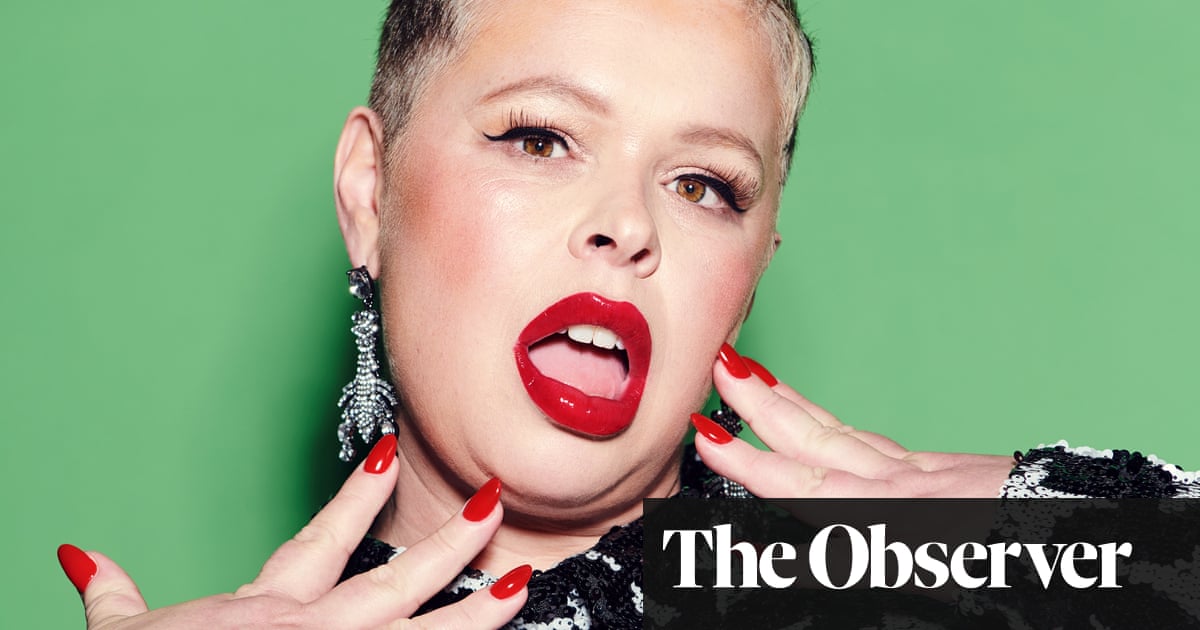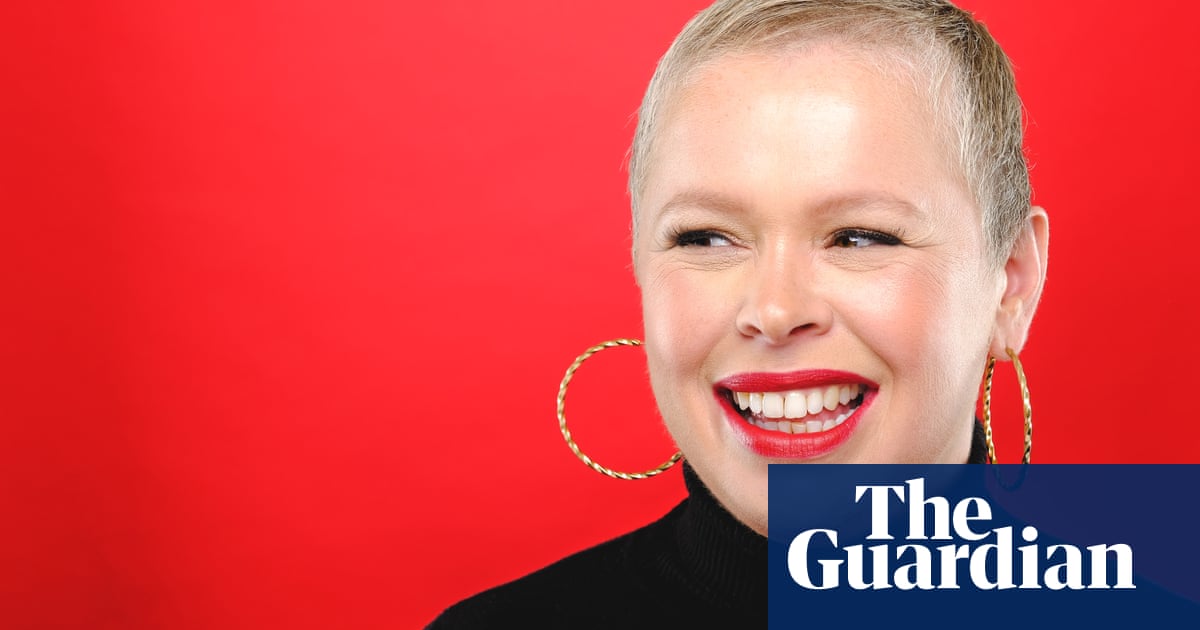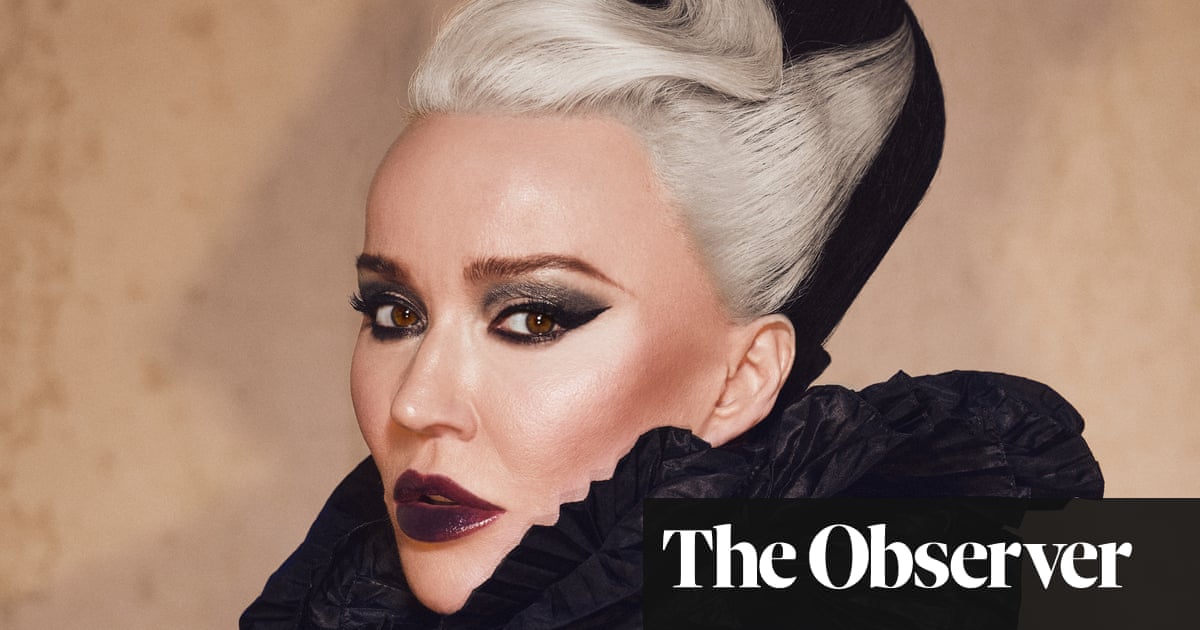
On Christmas Day 2018, I watched 300 years of French and Saunders and laughed until I cried. Then I cried again, for wasting my own 300 years. I wanted to be daft and funny and get paid for it. I’d always loved comedy and would plan whole standup routines in my head. I would always be funny – when I was parenting, teaching, or in meetings, tense family moments and phone calls to Virgin Media. A very brilliant and wise comedian told me that standup is not a career choice, but a diagnosis. This resonates. My journey into standup felt like I had got to a point where I could no longer not do it. I had to admit to myself I was, deep down, an idiot.
In Steven Pressfield’s book The War of Art he writes, “Most of us have two lives. The life we live and the unlived life within us. Between the two stands resistance.” I had finally stopped resisting. Early 2019, I was about to head back to work as a secondary school English teacher, after maternity leave with my third child. The unending pressure of attaining a certain level of GCSE results for the next 30 years lay before me. Like Homer Simpson announcing that he is heading to clown college, I announced to my husband I had booked myself on to a comedy course – and I’d used the credit card!
All was going swimmingly for a year until a wet market in Wuhan halted things. Teaching remotely and all the added pressures on teachers once we returned to the classroom solidified the decision for me to jump ship. A script commission from the BBC at the start of 2021 gave me the confidence to hand in my notice.
So, in September 2021 I did not return for the new academic year. That same month I also found a lump in my breast and was diagnosed with breast cancer – there were actually four tumours in my left breast, it was stage 3 (in my lymph nodes), it was grade 3, it was shit. What followed was a mastectomy, a second surgery for clearing the lymph nodes, six months of chemo, three weeks of daily radiotherapy and the overwhelming dread that I had left living my dream too late.
It felt as if there was some kind of inevitability about my diagnosis. I had lost a father and my sister to the disease. Plus, I was a hypochondriac and a drama queen – there was a weird peace that came when I found out. The background anxiety I’d always had about getting cancer disappeared once it happened. There was also a huge simplicity about what I had to do. There was not a thing in this world that I wanted, I could not name you one ambition, or desire, other than to stay alive.
Of course, there was the fear of dying, but loads of other stuff went. Even though I was living my dream, it did not feel as exciting as the jumping-off point. The first gig I ever did at an open mic, another comic said, “See you on the circuit,” and my heart burst. That was enough for me. I did then, and do now, feel fully at home with other comedians. I love them, even the dickheads. The dream was now the day job. I was going at it with the same mundane ambitious energy I had with everything else in life – agents and commissioners and producers seem to have found a way for the magical daft outsider weirdo’s artform that is comedy to be subsumed into a clear career path. There seemed to be a trajectory of panel shows, tours, specials, sitcom pitching, self-tapes, showcases and general meetings. And, of course, I want it all and I want money and a nice big house, but it all felt a bit frontal lobe – at least that’s where I had the headache and furrowed brow. I wanted freedom and daftness. So my cancer diagnosis gave me this weird permission to stop. I was made to take stock – urgently.
It gave me a licence to actually take care of myself. My first thought when I was diagnosed was, “At least it isn’t someone I love,” and then my second thought was, “Oh, I don’t count myself as someone I love.” My philosophy was, I would let the doctors treat the cancer and I would get on with life and love. So I learned about self care: I did yoga, restorative yoga, I got a spiritual healer, a hypnotherapist, a psychotherapist, a cranio-osteopath. I went plant-based – that’s right, cancer turned me middle-class. I’m so middle-class I even have a Radio 4 special and an article in the Observer Magazine.
I struggled with people’s responses when they found out I had cancer. The bad responses fell into two categories. First, those who wanted to make it all better and do the work for me: the advice givers, or those who self-associate, “Yeah my auntie had it, too”; the simpering heads to the sides; the conspiracy theorists, “You know it’s the chemo that kills you?” And second, those who wanted me to do the work for them: the “Thinking of you”, the “Let me know if there is anything I can do.” This did not give me much to go on and I resented having to do the emotional admin. The responses I welcomed most were from those who admitted they didn’t know what to say because same babe, same. Surprisingly, I always liked real-time responses that were real – expletives, pauses and inappropriate questions. Maybe that’s my love language. The expert view seems to support this: it is essential to be very present and receptive and make it about the person. I also appreciated people who risked the much more complicated version of “Thinking of you” which was “How are you?” Because how I was changed daily or hourly and I was happy to answer. I should add that my mate hated being asked how she was when she was sick. So maybe there is no way to get it right. In truth, it is impossible for anyone to say the right thing all the time, because my relationship with my diagnosis was so complex. As devastating as it was, it prompted a deep inward journey.
At the beginning I cried at every single appointment because of the unfairness and fear. I hated the thin yellowy letters from the hospital, I hated the hospital car park, I hated the waiting room, I felt so disempowered by it all. My diagnosis took time – until my mastectomy, they thought it was all contained, but after taking a sample of my lymph nodes during surgery, analysis showed it had spread, which meant a full body and bone scan to check whether it had metastasised anywhere else. I lay in bed the day before getting the results of those scans, crying my eyes out, facing up to the possibility of not seeing my kids grow up. But, when one of them knocked on my door, of course I shouted: “Go away!”
I was so lost in the bleakness of it all. But it hit me: my kids are downstairs now, my husband is downstairs now, life is downstairs now. I may find out in the morning that I have six months to live, or a year, I may have 50 more years – but whatever it is I have to enjoy each day. This is how I continue to try to exist. I have learned to be very present. I have stopped projecting and planning and comparing on social media. I am grateful for each day and do my best, for me, each day.
Paradoxically, this is what has really helped my career. The energy and love and gratitude with which I approach opportunities have been much more fruitful than the gritted teeth and planning approach I was bogged down with.
My dream was to step out on stage at Live at the Apollo and I achieved it, two weeks after finishing my cancer treatment and only three and a half years after starting comedy (not forgetting that little global pandemic thrown in the mix, too). I think that must be a record, surely? I also have small parts in a film, a sitcom, a drama, I have written for big shows, have projects in development with different broadcasters – I’m gigging with my heroes.
This may all seem boastful, but that is because we are trained in Britain to not show off. Fun fact: I love picturing my own funeral. This was the case before my diagnosis, but it really ramped up afterwards. And then I would panic that I was being negative. But I realised I was picturing my funeral because it was a guilt-free way of luxuriating in everyone being lovely about me. What a sad state of affairs, when the only way it is deemed OK to accept love and compliments is if you are dead. If someone compliments you when you’re alive, you have to say, “Oh God, no, shut up, I haven’t even washed my hair!” I don’t make the rules. But I have changed them for me. I love myself and am proud of myself and it has taken lots of processes to get to this point.
I cannot separate my diagnosis from my new and creative life. A book that was recommended to me that I have read and re-read is Cancer as a Turning Point by Lawrence LeShan, a psychotherapist who’d worked with cancer patients for more than 40 years by the time the book was written. One thing he notes is that up until 1900, the link between cancer and psychological factors was commonly accepted in medical circles. Through his own experiences with patients he observed the improvements in remission when patients had purpose and pursued their passions. But he is keen to note, as am I, that: “You are not responsible for getting ill and you are not responsible for your recovery.”
I resent all the social-media language that has now taken root in cancer diagnosis and treatment, like: “You’re gonna kick cancer’s ass.” People die of cancer not because they didn’t “think positive” or they weren’t good fighters, but because sometimes there is no rhyme or reason – sometimes it is aggressive or it is diagnosed too late. Not to mention children getting cancer. The whole “kick cancer’s butt” stuff is misleading: even if you survive, it always kicks your butt, and you have to adjust to who you are after it, gathering together your menopausal, one-breasted, ovary-less, bald body and looking at your husband as if to say “Erm, is this anything? Are you into this, you weirdo?”
That said, my cancer diagnosis seemed to me confirmation that my job and my life had been killing me – literally. Perhaps there was something prescient about my late career change. At 18, I did not have much ambition or confidence, in fact I was a bit lost. I had my first daughter when I was 20 and I knew I wanted to be more for her. A chance meeting with my old English teacher at the local leisure centre inspired me to go back to uni and get an English degree. By inspired I mean she told me off for not doing an English degree. I completed it while my toddler and I were bouncing from one temporary accommodation to another. I then did my teacher training and life looked and felt more settled. I met my now husband and we had two more children. I had finally got to a point where the boxes were ticked – a profession, a marriage, kids! I was a good girl, I was bona fide. I was stressed.
All I could think was, is this it? I was living the wrong life. I thought about WH Auden’s description of cancer as a “foiled creative fire”, and Brené Brown’s assertion that “unused creativity is not benign”. Am I trying to argue that if you don’t keep up the doodling you’re going to get cancer? No, of course not. But what does an unfulfilling life lead to? Comfort eating? Alcoholism? Depression? Stress? Anger? Resentment? It is not benign.
We are all going to die one day. Cancer made me face that head on. Life is such a gift, and it is not to be wasted. I have never felt more connected to other humans than when I was at the chemo ward or receiving daily radiotherapy. Everyone who’s fighting for their life sheds all the layers of the stupid stuff that separate us. People’s regrets when dying are well documented and one that often comes up is caring too much what other people think. I am not dismissing any of my achievements before standup; my degree, my teaching career and especially raising my beautiful children are all wonderful, but a lot was done for the approval of others. I had a core passion and ambition that always felt inaccessible or underserved or risky or foolish. It took a long time to let it out. More than my fear of dying was my fear of dying having never fully lived.
There is a great bit in Seinfeld where Elaine shouts in defence of Jerry: “It’s very hard being a standup comedian. Sometimes they don’t laugh!” That was it. That was what caused my decades of resistance to my unlived life. The fear of it not going well. What silly little humans we are. My hope is that everyone gets to a point where resisting feels more risky than surrendering to the fullness of life. I also hope that it won’t take them a cancer diagnosis to learn the lessons I have.
How not to screw it up
Comic Laura Smyth’s 10 commandments on what not to say to people with cancer
‘My aunt/nan/neighbour has it’ Not helpful or relevant, and takes focus away from ME, ME, ME.
‘It’s fine! Cancer treatment has come on so far’ Toxic positivity. Minimised my feelings and was also said with no knowledge of what stage or grade my cancer was. Also, I must have missed that oncology specialism you did.
‘Let me know if there is anything I can do’ Too open- ended and non-specific, puts pressure on the person to think of something and even if we do think of something (a lift? Babysitting?), you usually can’t do it so just offer what you can or, even better, just do it. I started asking for Neal’s Yard diffusers. They never asked again.
‘What caused it?’ Hard to believe, but people did ask this. It’s crazy to put the onus on the person suffering. One in two will get it. I blame late capitalism.
‘Thinking of you’ Painfully pointless and hard to respond to. Also, when this comes through as a text when you are having a good day, it drags you down to remembering you are ill.
Nothing So many people presumed I was getting inundated, so didn’t want to bother me, and then very few people actually did.
‘Don’t trust western medicine’ I love a conspiracy as much as the next man who never landed on the moon, but I’m putting all my faith in the chemo so keep your tin hat to yourself.
‘You got this!/You’re gonna kick cancer’s ass!’ I can hear the American twang in your voice. Behave yourself, you’re from Lewisham.
‘You should…/I heard of this lady who…’ Advice givers want to solve
things rather than sit with your discomfort. It’s like a game of hot potato – Cancer? Gaaargh quick, soak it in white vinegar and Epsom salts.
Race for Life Not totally against it, but please wait until after I have died so I don’t have to hear about it every five minutes on Facebook – can’t help but feel you are making this about you, Susan! Same goes for shaving your head.
Laura Smyth is touring the UK and Ireland with her debut tour Living My Best Life until autumn 2024. Tickets and details at laurasmyth.com. Laura’s BBC Radio 4 special, I Don’t Know What to Say, is available on BBC Sounds












